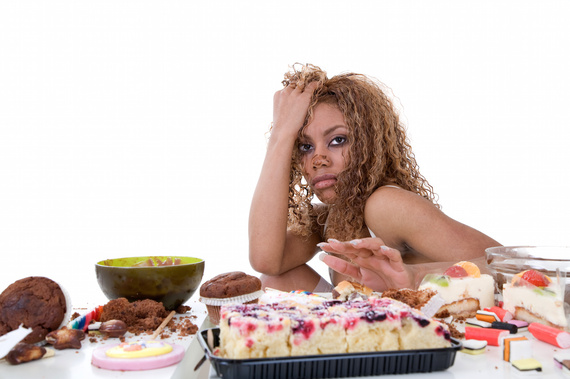Emotional eating is something that everyone does once in a while. The problem arises when emo-eating becomes a regular occurrence. Many people who frequently emotionally eat usually have a tough time coping with strong, unpleasant emotions that they are currently experiencing. Eating becomes a way for the person to "escape" from the situation because planning what you will eat, preparing the food and then escaping into a probable "food coma" all are temporary distractions from whatever is going on in that person's life at the moment. If you find that you are reaching for food when you're not hungry quite often, use the following steps to help you curb the emo-eating habit for good.
1. Acknowledge that you are actually emotionally eating
You can't possibly know that your emo eating until you take a moment to ask why you are eating in the first place. Ask yourself, "Am I physically hungry right now?" If the answer is no, then move on to the next step.
2. Ask, "Why am I eating?"
You'll need to come up with a list of reasons like, I'm stressed, bored, tired/need an energy boost, procrastinating, need a break from a lame activity, etc. The more you explore these reasons why, the better you will be able to understand your emotional eating triggers (more on that in #5).
3. Now that you have your why, ask "What do I need right now?"
The reason emotional eating is such a huge problem for so many people is because most of us were never taught to deal with our emotions in a healthy way. It's the reason there are so many people with substance addiction problems -- they usually stemmed from not having the skills necessary to deal with unpleasant emotions. By asking "what do I need right now?" you are helping yourself discover what you actually need in lieu of food. Some needs might be a hug, a listening ear, something fun/exciting to do, a good long cry, alone time, a break, etc. And guess what? The thing you come up with will never be "eat the entire jar of Nutella."
4. Make a plan.
Once you find out what it is you need, come up with a list of things you can do to fill those needs that have nothing to do with food. Take a piece of paper and write some of the basic emotions that you normally experience that usually make you eat, and list them across the top. Make them into columns. Under each emotion column, make a list of activities that you would enjoy to do instead of eating. Post this list in your kitchen -- either on your fridge, above your kitchen table or on your pantry door.
This list can contain anything that suits you -- the Internet is a great resource if you get stuck, just Google "things I can do when I'm_______ (name the emotion)."
Some examples include:
Boredom: If you're bored and you are eating to take up time, you can grab out your phone and play a game, like Tetris.
Sadness: Journal, have a good cry, create or color or craft something, take up a new hobby.
Exhaustion/Tiredness: You need to go put your head down for 15 minutes or take a nap if possible.
Anger: Exercise (especially vigorous) is a powerful way to dispel your anger.
Procrastination: Procrastination eating, or as I call it "Procrastieating," is usually a sign that you need to take a break from the task at hand or find a way to make the task fun or enjoyable. You could also postpone the task (if possible) in order to keep you from eating to avoid it.
Fear/Worry: Call a friend who listens really well or can calm you down when you feel fearful or worried.
5. Get to know your "Triggers" and then work to eliminate them.
Once you've practiced handling your emotions without using food to cope, you need to start noticing what triggers your emotions or your desire to eat in the first place. When you're discovering your why for emotional eating use these unpleasant emotions as a guide for what's not working for you in your life. If you're finding that you feel a strong urge to eat an entire bag of chips after you talk to your mom about your parenting, you might want to come up with ways to avoid that particular trigger. Maybe avoiding that subject all together could be the answer, or perhaps a simple conversation with your mother about how she makes you feel when you talk about parenting might be also be a good solution. Maybe you feel bored at cocktail parties so you sit by the appetizer table and munch all night long to cure your boredom. In this case, you need to avoid attending them all together, or challenge yourself to meet four new people at the party and fill your boredom with interesting conversation on topics that light you up.
Emotional eating is something that we all struggle with from time to time. Know that the strategies in this post take time to implement and master. Remember to have patience with yourself and know that you will get better with practice overtime. Do not ever berate yourself for emotionally eating, as that will push you to do it more. Instead, take the time to congratulate yourself for your accomplishments -- big or small as they may be.
Want to learn how you can fix your relationship with food forever (and shed weight while doing it)? Click here to check out my new course, Un-Dieting!
---
If you're struggling with an eating disorder, call the National Eating Disorder Association hotline at 1-800-931-2237.
